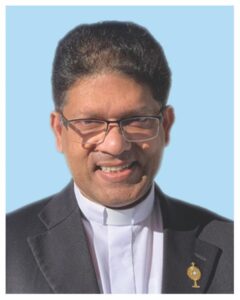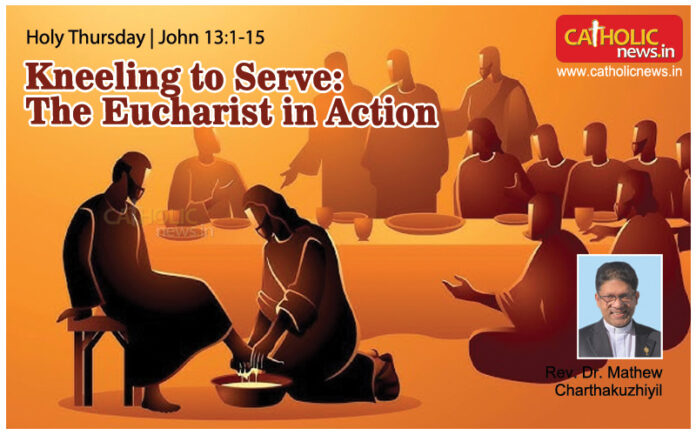
On this Holy Thursday, we gather to commemorate two of the most profound gifts Jesus bestowed upon us: the Holy Eucharist and the Priesthood. These sacraments are inseparable, each sustaining the other, both instituted by Christ on the night before he laid down his life for us. Yet, alongside these sacred mysteries, Jesus gave us another enduring example that evening – the washing of his disciples’ feet. This humble act reveals the heart of what it means to follow him.
In the time of Jesus, washing feet was no small gesture. People walked dusty, unpaved roads in sandals, their feet caked with grime by day’s end. This task fell to the lowest servants, a job beneath anyone of status. Imagine the shock, then, when Jesus – their teacher, their Lord – removed his outer garment, tied a towel around his waist, and knelt before his disciples to wash their feet. The Son of God took on the role of a slave. After finishing, he said, “I have given you an example, that you also should do as I have done to you” (John 13:15). This was not just a lesson in humility; it was a radical redefinition of love and leadership.
That same night, Jesus instituted the Eucharist, giving us his Body and Blood. These two acts – foot washing and the Last Supper – are deeply intertwined. The Eucharist is Christ broken and given for us, a total gift of self. When he said, “Do this in memory of me,” he was not only speaking of the bread and wine but also of the life he modeled – a life poured out in service. To receive the Eucharist is to be nourished by Christ, but that nourishment demands a response. It calls us to kneel, to serve, to give ourselves for others, especially the poor, the suffering, and those crying out for healing. The Eucharist and foot washing are two sides of the same coin: receiving Christ compels us to become like him.
Jesus says: “The greatest among you must be your servant” (Mt. 23:11). True greatness lies not in power or recognition but in humility and love. Consider St. Teresa of Calcutta, Mother Teresa, who lived this truth. She saw Jesus in every person she served, saying, “In the Mass, we have Jesus in the appearance of bread. In the slums, we see Christ and touch him in the broken bodies, in the abandoned.” Her life was a living Eucharist, fueled by her devotion to Christ in the Blessed Sacrament, as she knelt to serve the poorest of the poor – just as Jesus knelt before his disciples.
We may not all be called to such extraordinary service, but we are all called to wash feet in our own way. It might be helping a neighbor, listening to a friend in distress, or offering our time to a cause that lifts up the downtrodden. Every small act of kindness mirrors Christ’s example. Tonight, as many churches reenact the washing of feet, we are invited to reflect: Whose feet am I willing to wash? How am I serving those in need? Does my participation in the Eucharist transform me into a servant like Christ?
Holy Thursday marks the start of the sacred Triduum, leading us to the cross and resurrection. It reminds us that to follow Jesus is to kneel, to serve, and to love without limits. The Eucharist strengthens us for this mission, but it is through our service that we make Christ present in the world. Let us embrace this call, bringing his healing touch to the broken lives around us. This week, let each of us find one way to wash the feet of another, to serve as Christ served. And may this be the beginning of a life where, like the Eucharist, we are broken and shared for the world’s healing.
Rev. Dr. Mathew Charthakuzhiyil



